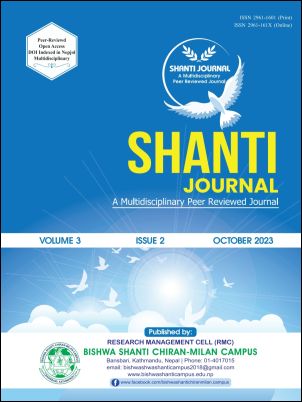The Expression of Psychological Trauma: A Study of Prakash Saput’s Bola Maya and Pir
DOI:
https://doi.org/10.3126/shantij.v3i1-2.60759Keywords:
Psychological pain, trauma, perception, society, YoutubeAbstract
Giving the feelings of real-life situation to the audiences through the expression of physical, mental and psychological pain is common in Nepali music. In this regard, this study aims to analyze the issues of psychological trauma in two songs of Prakash Saput which give the realization of their actual condition to the audiences, and it further discusses the major effects of those inner pains. The study explores a qualitative approach along with unstructured interview as the tool for data collection. In the study, the lyrics and some snapshots of two very popular creations of a popular singer, music director and composer Prakash Saput which clearly replicate the psychological trauma of the people in our society are selected as the major text for research. They are entitled ‘Bola Maya’ and ‘Pir’. A branch of traumatic theory, psychological trauma is taken as a theoretical base for discussion. The songs for analysis were taken from the official You-tube channels of Prakash Saput and the secondary data were collected from authentic sources such as library, google scholar and newspaper articles. To make the research strong, the perceptions of the creator himself, other singers, a researcher who did research in folk music and a listener of the songs were taken through interview and other secondary sources. The finding of the research shows that the creator of such songs creates these sorts of creations to replicate the real-life trauma of the people in our society who are compelled to face different kinds of traumatic situation due to which people have to think several time before going for foreign employment.
Downloads
Downloads
Published
How to Cite
Issue
Section
License
Copyright (c) 2023 The Author(s)

This work is licensed under a Creative Commons Attribution-NonCommercial 4.0 International License.
This license enables reusers to distribute, remix, adapt, and build upon the material in any medium or format for noncommercial purposes only, and only so long as attribution is given to the creator.




